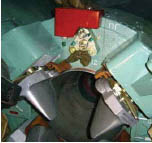Proliferation Security Initiative(There is an updated version of this fact sheet dated February 9, 2006 and located at http://www.state.gov/t/isn/60896.htm)
Bureau of Public Affairs
Washington, DC
September 15, 2003
[PDF]
![Photo collage [AP Photos]](https://webarchive.library.unt.edu/eot2008/20080922144446im_/http://www.state.gov/cms_images/psi_banner.jpg)
The Proliferation Security Initiative (PSI), announced by President Bush in Krakow, Poland on May 31, 2003, is a multinational response to the growing challenge posed by the proliferation of weapons of mass destruction (WMD), their delivery systems, and related materials worldwide. The increasingly aggressive efforts by proliferators to circumvent existing nonproliferation norms, and to profit from such trade, require new and stronger actions by the international community.
|
n Eleven nations participating as PSI core group: Australia, France, Germany, Italy, Japan, Netherlands, Poland, Portugal, Spain, U.K., U.S.
n PSI participants call on all states concerned with this threat to join in similar commitments.
n PSI will utilize existing national and international legal authorities and seek to strengthen these authorities to meet today’s WMD proliferation challenges.
n Regional exercises will be held in the coming months to practice international cooperation to implement PSI interdiction principles. | PSI activities will be consistent with national legal authorities and existing international treaties and regimes. It will involve all states that have a stake in nonproliferation and the ability and willingness to take steps to stop the flow of such items at sea, in the air, or on land.
The Initiative is consistent with and a critical step in the implementation of the UN Security Council Presidential Statement of January 1992, which states that the proliferation of WMD constitutes a threat to international peace and security, and underlines the need for member states of the UN to prevent proliferation.
PSI participants committed to the following interdiction principles:
- Undertake effective measures, either alone or in concert with other states, for interdicting the transfer or transport of WMD, their delivery systems, and related materials.
- Adopt streamlined procedures for rapid exchange of relevant information.
- Work to strengthen their relevant national legal authorities to accomplish these objectives and work to strengthen international law and frameworks.
- Not transport or assist in the transport of any cargoes of WMD, their delivery systems or related materials to or from countries or groups of proliferation concern.
- Board and search any suspect vessels flying their flags in their internal waters, territorial seas, or areas beyond the territorial seas of any other state.
- Board and search any suspect vessels flying their flags in their internal waters, territorial seas, or areas beyond the territorial seas of any other state.

- Consent under the appropriate circumstances to the boarding and searching of their own flag vessels by other states, and to the seizure of such WMD-related cargoes.
- Stop and/or search suspect vessels in their internal waters, territorial seas, or contiguous zones, and enforce conditions on suspect vessels entering or leaving their ports, internal waters, or territorial seas.
- Require suspect aircraft that are transiting their airspace to land for inspection and seize any such cargoes, and deny aircraft transit rights through their airspace.
- Prevent their ports, airfields, or other facilities from being used as transshipment points for WMD-related cargo.
(For full Statement of Interdiction Principles please visit www.state.gov)
|

